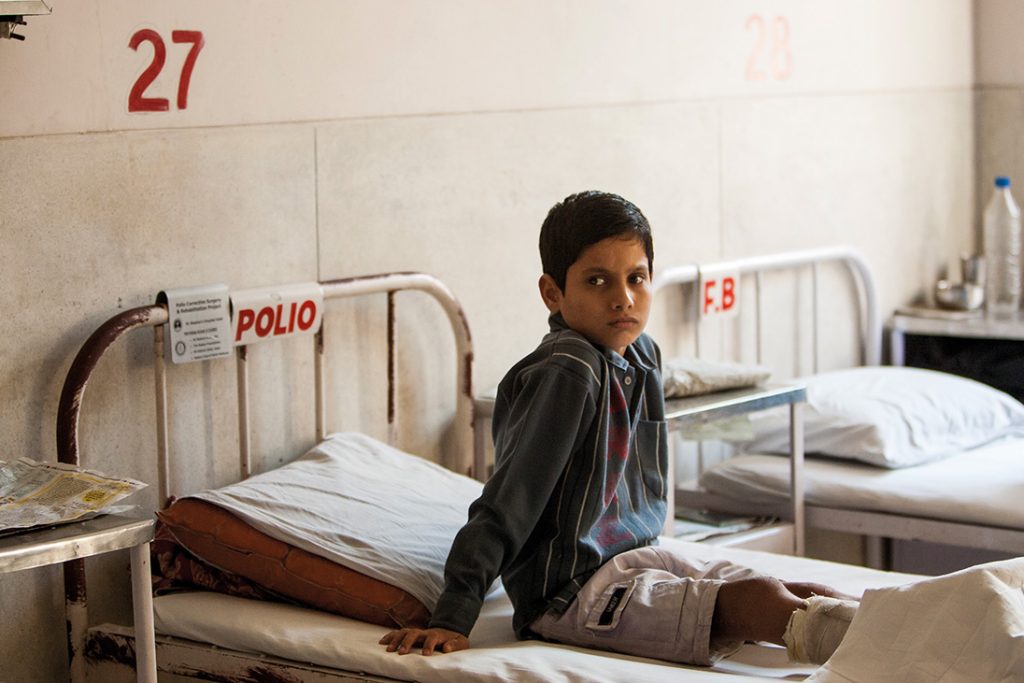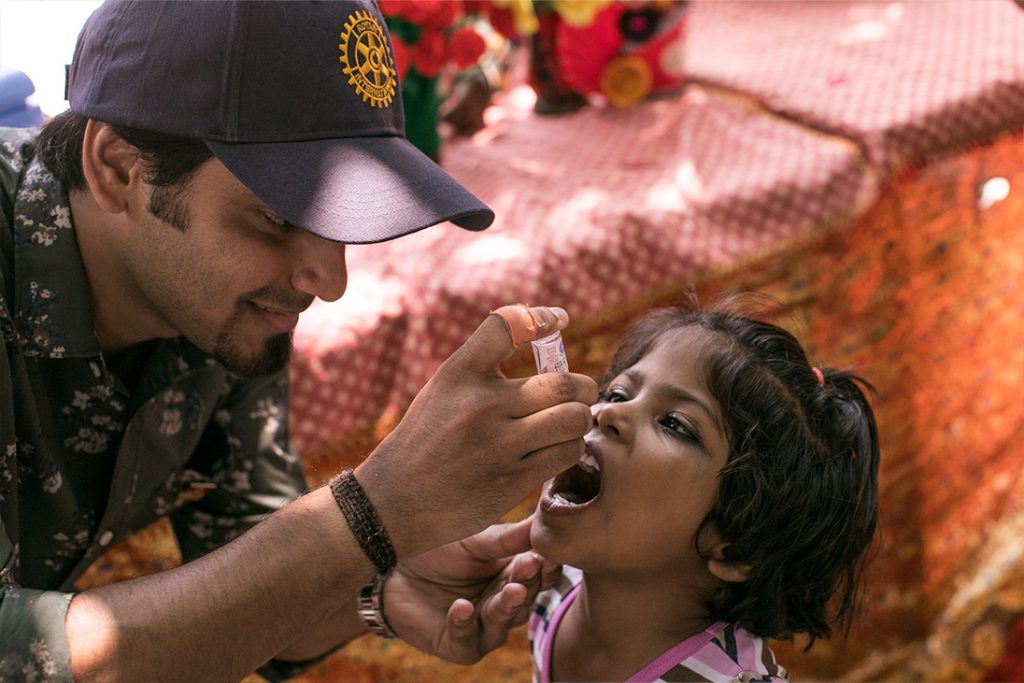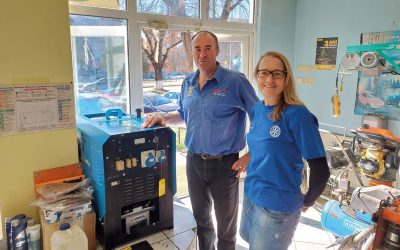When the bombshell landed in Beckton, it exploded with a ferocity which could be felt the world over. Polio had been discovered in London’s Docklands.
Not since 1984 has there been a case of polio in the United Kingdom, which was declared polio-free in 2003. Polio is considered eliminated in most first world countries – Afghanistan and Pakistan are the only two countries in the world where the infection is still classified as endemic.
However, its emergence in east London reminded us of the irreducibly global nature of health.
Listen to this article
The announcement was made in June by the UK Health Security Agency (UKHSA) who had discovered the poliovirus in samples collected between February and May this year from the Beckton sewage works which serves a population of four million in north and east London.
Scientists believe the virus originated from someone who immunised aboard with the live oral polio vaccine, which hasn’t been used in the UK since 2004. No actual cases of polio have been detected or confirmed.
For Rotary, which has been at the heart of efforts to tackle the debilitating disease since launching its PolioPlus campaign in 1985 and becoming a founding member of the Global Polio Eradication Initiative in 1988, the news from London was a blow.
Mark Esho, a member of Leicester Novus Rotary Club, woke up paralysed from the neck down after contracting polio aged just five. He said that when he heard the news about the polio discovery in the capital his blood ran cold.
He said: “When I saw the news from London, it sent a shiver through my spine. I thought the last thing we need is a polio outbreak. It’s a horrible, horrible virus. I just pray that this doesn’t happen to someone else.”
The poliovirus is opportunistic and will exploit gaps in population immunity wherever it finds them.”
Just days before the news broke, Colin Powell from Radlett Rotary Club in Hertfordshire, was speaking to the Prince of Wales about living with polio when they met at St Paul’s Cathedral for the Platinum Jubilee Thanksgiving Service for Her Majesty The Queen.
He said: “For all of us within Rotary who work so hard for polio eradication such news brings great sadness.
“My first reaction is that people should not panic, but just ensure that not only new-born babies are vaccinated against this wretched paralysing disease, but also adults who were not previously vaccinated.
“I received my polio vaccine upon the birth of my first grandchild following medical advice when I was aged 47. This left me extremely depressed for several weeks thereafter thinking how different my life would have been had the polio vaccine been available when I was born in 1949.
“Let’s hope that we can turn bad news into good news by all of us in Rotary now working with even more vigour to globally eradicate polio.”
Following the announcement of the Beckton discovery, the UKHSA sought to allay fears, suggesting the risk of someone catching polio in the UK was low. However, they urged parents to ensure their children have been fully immunised against the disease.
Dr Vanessa Saliba, a consultant epidemiologist at UKHSA said: “Vaccine-derived poliovirus is rare and the risk to the public overall is extremely low.
“Vaccine-derived poliovirus has the potential to spread, particularly in communities where vaccine uptake is lower.
“On rare occasions it can cause paralysis in people who are not fully vaccinated so if you or your child are not up to date with your polio vaccinations it’s important you contact your GP to catch up or if unsure check your red book.
“Most of the UK population will be protected from vaccination in childhood, but in some communities with low vaccine coverage, individuals may remain at risk.
“We are urgently investigating to better understand the extent of this transmission and the NHS has been asked to swiftly report any suspected cases to the UKHSA, though no cases have been reported or confirmed so far.”


“Vaccine-derived poliovirus has the potential to spread, particularly in communities where vaccine uptake is lower.” – Dr Vanessa Saliba
An inactivated polio vaccine is used in the UK as part of the routine childhood programme. It is given to children three times before the age of one, and then again at three and 14 years of age.
In rare cases, the virus can be transmitted to others and mutate into what is known as ‘vaccine-derived’ polio. Although weaker than the original, or ‘wild’ form of the disease, it can still cause serious illness, including paralysis, in people who are unvaccinated.
Polio vaccine coverage in the UK has fallen slightly in the last five years, from a peak in 2013 to 92.6% in 2020/21 for children aged one. But coverage of the teenage booster shot, given at age 14, has fallen further due to school closures during the covid pandemic, and in London it was 71%, although this has now risen to 78%.
UK coverage for all childhood vaccinations, which covers diphtheria, tetanus, polio, pertussis, hib and hepatitis B, plateaued between 2011-12 and 2013-14, and has since declined, according to analysis from the Nuffield Trust.
Judith Diment, a member of Rotary International’s PolioPlus Committee, admitted that although the detection was disturbing, it was not unexpected.
She said: “This is another example of what we have been saying for many years – as long as polio exists anywhere it is a risk to children everywhere. It is only a plane ride away.
“We know how to prevent and stop such outbreaks, and have demonstrated that these strategies work, even in the most challenging environments.
“The poliovirus is opportunistic and will exploit gaps in population immunity wherever it finds them.
“Rotarians can play a key role in raising funds and awareness to achieve a polio-free world and ensure that we protect the gains we have worked so hard to achieve.
“Note the vital importance of continued vaccination in polio-free countries to mitigate the risk of a possible outbreak. It’s important for Rotarians to continue to reinforce confidence in immunisation as a safe and effective way to protect against polio and other vaccine preventable diseases.”
My first reaction is that people should not panic, but just ensure that not only new-born babies are vaccinated against this wretched paralysing disease, but also adults who were not previously vaccinated.”
Following the detection in Beckton, UK health authorities declared a national incident and informed the World Health Organization (WHO) of the situation. Monitoring the event closely in Geneva is Aidan O’Leary, the Director for Polio Eradication at the WHO.
Like Judith, he was unsurprised by the news from London. “No country is immune from polio, as this event in London clearly highlights,” said the Irishman.
He praised the UK health authorities for detecting a public health threat before it was able to cause any infection.
“Thanks to this, the UK is now able to respond: meaning expand and strengthen further their environmental disease surveillance, alert health providers to look out for symptoms of paralysis in children, and – most importantly – identify clearly any vaccination gaps and ensure those children may also be fully protected.
“These are exactly the right things to be doing. Until polio is eradicated, this is the best thing any country can do: maintain strong disease surveillance and high vaccination coverage, to minimise the risk and consequences of any polio re-emergence.”
The WHO official said that the incident in London had given a tiny glimpse of what might happen if the common goal of global polio eradication is not reached.
“The reality is, we will continue to see such events, until we achieve global eradication,” added Aidan. “It’s inevitable.
“The good news is that we know what it takes to eradicate polio. We have the strategies. We have the medical and diagnostic tools. From a biological and technical point of view, the feasibility of achieving eradication is completely established. We have tremendous support, from tremendous partners.


“It’s important for Rotarians to continue to reinforce confidence in immunisation as a safe and effective way to protect against polio and other vaccine preventable diseases.” – Judith
“Rotary International and Rotarians around the world are, of course, leading the way; raising funds, engaging with leadership in polio-affected and donor countries.
“Political, community and medical leadership in Pakistan and Afghanistan, the last two countries which remain endemic to wild poliovirus, are literally in overdrive to finding the remaining ‘zero-dose’ children, i.e. those children who have never been reached and immunised.
“Political fora, ranging from the G7, G20, the Commonwealth to the World Health Assembly, all recognise the opportunity. All are urging for global commitment, all are calling for increased support and leadership in finishing the remaining strains of wild poliovirus transmission.
“But we cannot achieve success unless we redouble our efforts. The event in London, and others elsewhere, must spur us on.
“All countries will benefit equally from a polio-free world, but that means they should also invest equally into achieving such a world.
“In October, Rotary and other partners such as the Government of Germany, are hosting a global polio pledging moment at the World Health Summit.
“This is a perfect opportunity for international partners everywhere to come together to recommit to this effort, and we hope of course that the Governments of the UK and the Government of Ireland will join their Rotary friends at this event too.”


























































